Rock Island Frieze Lectures To Focus on Old, New Pandemics
Given that 2020 is certainly a year for the history books, it’s no surprise that the 23rd annual Frieze Lecture Series for the Rock Island Public Library takes a deeper look at our reaction to global pandemics, past and present.
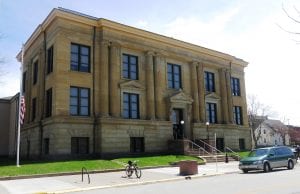
The downtown Rock Island Public Library.
The free, two-part series will be presented by Augustana College professors with expertise in history and public health. The following lectures will be offered online at 2 p.m. on two Tuesdays, Oct. 20 and 27 –
Tuesday, Oct 20: Why We Forgot the 1918 Flu: A Historian Looks at a Century of Pandemics. Dr. Lendol Calder, professor of history at Augustana College, will consider the global influenza pandemic of 1918. His presentation reviews America’s response to the 1918 pandemic, as well as how the legacy of that tragedy has — and hasn’t — shaped responses to subsequent public health emergencies.
Tuesday, Oct. 27: Tip of the Iceberg: Understanding the Bigger Picture of Pandemic Disease Severity. Dr. Rebecca Heick, assistant professor of public health at Augustana, considers the rising death toll of the ongoing Covid-19 pandemic. While it is understandable that the number of deaths has become a major focus of media reports and intervention efforts, mortality is just the tip of the iceberg. Less severe disease is much more common and is an important component of the bigger prevention picture.
Over 7.9 million Americans have been diagnosed with Covid-19, and it has caused 216,022 deaths as of Wednesday, Oct. 14. There have been 7,216 positive cases in Scott and Rock Island counties, with 125 deaths caused by the virus (three times as many deaths have been in Rock Island County).
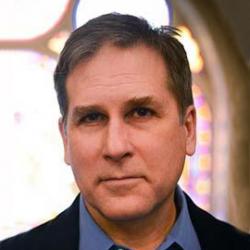
Lendol Calder is an Augustana College history professor.
This past spring, Rebecca Heick was a prominent source of advice throughout a series of Covid-19 Q&A sessions on KWQC-TV. She has given perspective on the importance of social distancing, how to break the chain of transmission, and differences between Covid and the seasonal flu.
Heick said in a piece at augustana.edu that she’s glad to provide a “measure of calm and comfort in the midst of what can feel chaotic and even a bit scary at times.”
This past semester, Heick taught an epidemiology course at Augustana, and said the Covid outbreak, while serious, also provides a valuable teaching opportunity to give public health students an inside look at a real pandemic.
The current crisis provides her students “a window into the organizations involved, the research as it is occurring, and the challenges of handling media of all types to ensure clear, confident communication with the public,” she said.
Calder, who specializes in American history, said this week of his Frieze lecture: “The big question I want to pose is, how did a pandemic that killed 675,000 so quickly fade from national consciousness? To the point where, one year ago, if you asked me about the 1918 pandemic, I probably couldn’t have told you a single fact about it.
“It’s not in the history books, it’s not in school textbooks,” he said. “Almost no great literature came out of it. Most people totally forgot about it, which sounds crazy that somebody could forget about our current Covid-19 pandemic. They forgot about one that was even bigger.”
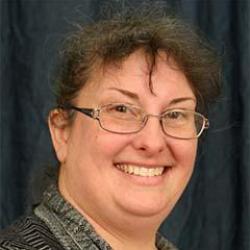
Rebecca Heick is an assistant professor of public health at Augie.
Most of the talk will be a narrative of the pandemic – how it started, the three waves, the influence of how it killed people, Calder said. There may be a couple lessons on how we can reflect on the current pandemic.
“For example, how often medical experts can be wrong,” he said. “Science looks forward and it has to make a lot of mistakes. We’ve certainly seen that this time around.”
For whatever reason, the 1918 outbreak was never a big story, partly because of the limited media at the time, compared to today, Calder said.
“Today we have a 24/7 news cycle; private individuals can make public what their experiences are,” he said. “That did not exist 100 years ago. Even worse, government officials and sometimes city leaders refused to talk about the 1918 flu.
“President Wilson never once mentioned the flu in any presidential communication,” Calder said. “Ironically, he himself died from it. It just wasn’t a story that was told in many official government or media outlets, even as it was happening.”
Woodrow Wilson suffered a violent cough April 3, 1919, and was diagnosed with the Spanish flu. He suffered his second major stroke that October, and his wife Edith made decisions in his stead until he left office in March 1921. He died from a stroke and heart complications at 67, on Feb. 3, 1924.
“Consciousness and memory of it faded pretty quickly, and the reason for that is, no narrative ever developed to explain the 1918 flu,” Calder said. “And without a story, it’s hard to remember something. It kind of got lost in the much bigger story of World War I.”
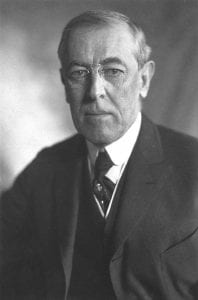
Woodrow Wilson got the Spanish flu in 1919 and died in 1924.
Total U.S. deaths from World War I (from 1917-18) were 116,516, out of 4.7 million U.S. military who served. The Spanish flu even claimed more Americans than servicemembers killed during World War II.
“Unlike the World War I event, which had bad guys and good guys, Americans struggled to tell the story about the flu,” Calder said. “It’s invisible; people didn’t know where it came from back then. It lacked main characters; it lacked plot; it lacked a central conflict. It lacked heroes who were using some kind of instrument to defeat the monster.
“All the things that make a story were absent in the 1918 flu pandemic,” he said. Actions to fight it were taken at the local and state level, while the federal government tried to ignore it.
“They hoped nobody would notice it was there, because it was considered to be a threat to national morale during the war,” Calder said. “Cities had to step up, and that’s where they had similar fights over where you should wear masks or not; whether to make them mandatory or not.”
“Today, many people wish that Trump had done more, but he did some things,” he said of the current president. “There’s a CDC today, which you didn’t have back then. We have much more robust national response this time than last time.”
In 1918, the difference of opinion in preventing the flu was there, but not politicized like it is today, Calder said.
A big lesson today is, “Trust the experts, but don’t trust absolutely,” he said. “Experts are going to be wrong, especially medical and scientific experts, who are learning on the fly, in the case of a virus that’s novel.”
“Experts, like anybody else, are prone to hubris and they can sometimes speak a little too confidently about what they know,” Calder said. “That can cause policies that misfire. It also causes a kind of ignorance of what’s been learned from previous pandemics. Trust, but verify, was the old Cold War expression.”
“We need to understand how science works – it doesn’t work in a straight line,” he said. “That’s the nature of scientific knowledge.”
“You have to wait for a consensus on what is to develop,” he added.
Commonalities of old and new pandemics
After the 1918 pandemic subsided in the winter of 1920, at least 50 million people had died worldwide, including 675,000 in the U.S. It reached its height during the final months of “the war to end all wars,” which mobilized tens of millions of young men to the European theater of battle, according to the National Institutes of Health.
When influenza appeared in 1918, Americans responded to the incursion of disease with measures used since antiquity, such as quarantines and social distancing. During the pandemic’s zenith, many cities shut down essential services.
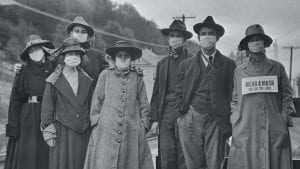
People in 1918 California risked jail if they didn’t wear masks. (Photo credit: Niday Picture Library/Alamy)
Across the nation, hundreds of thousands of personal tragedies unfolded and irrevocably changed the lives of those who survived, the NIH wrote. Children were orphaned, a disproportionate number of young adults died, and for a brief period fear, suspicion, and panic prevailed. Yet even in this trying context, the historical record reveals that many Americans responded courageously during the crisis.
Historians and journalists have long been interested in this dramatic chapter in American life and have produced an impressive body of books, articles, and multimedia on this topic. The memory of the 1918 pandemic has also left a lasting mark on public health policy, planning, and practice.
In San Francisco, health officials put their full faith behind gauze masks, according to History.com. California governor William Stephens declared that it was the “patriotic duty of every American citizen” to wear a mask and San Francisco eventually made it the law. Citizens caught in public without a mask or wearing it improperly were arrested, charged with “disturbing the peace” and fined $5.
In John M. Barry’s 2005 book, The Great Influenza: The Story of the Deadliest Pandemic in History, he wrote that masks city officials claimed were “99 percent proof against influenza,” were in reality hardly effective at all. San Francisco’s relatively low infection rates were probably due to well-organized campaigns to quarantine all naval installations before the flu arrived, plus early efforts to close schools, ban social gatherings and close all places of “public amusement.”
The first recorded infection was in a U.S. Army private stationed at Fort Riley, Kansas on March 4, 1918. Although the U.S. and the other nations at war initially suppressed news of the flu (neutral Spain freely reported it, hence the misnomer “Spanish flu”), there was a sense that following these new health precautions was patriotic, according to another piece at History.com.
As one Red Cross PSA put it, “the man or woman or child who will not wear a mask now is a dangerous slacker.” This sense of wartime duty—and the fear of being seen as a “slacker”—may have motivated those who complied with mask orders in cities like San Francisco, Seattle,
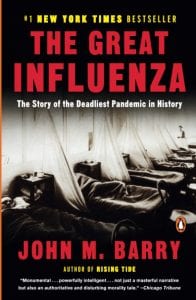
The cover of the book, “The Great Influenza: The Story of the Deadliest Pandemic in History.”
Denver and Phoenix.
“You read routinely about people not wanting to wear them because they’re hot and stuffy,” said Nancy Bristow, chair of the history department at the University of Puget Sound and author of American Pandemic: The Lost Worlds of the 1918 Influenza Epidemic. “Some people argue against them because they say that they create fear in the public, and that we want to keep people calm; which I think is really an excuse to critique them because someone doesn’t want to wear them.”
Some businesses worried customers would shop less if they had to wear a mask when they went outside, and some people claimed mask ordinances were an infringement upon civil liberties. Yet “more important in terms of critiques,” Bristow says, “is this idea that we’ve heard today as well that they give people a false sense of security.” As she points out, wearing a mask is less effective when people don’t follow other health guidelines too (and especially if some are poking holes in their masks to smoke).
Cities that passed masking ordinances in the fall of 1918 struggled to enforce them among the small portion of people who rebelled. Common punishments were fines, prison sentences and having your name printed in the paper. In one horrific incident in San Francisco, a special officer for the board of health shot a man who refused to wear a mask as well as two bystanders.
Fatal violence also has occurred this year due to debates over mask wearing during Covid.
In May, three family members were charged in the killing of a security guard who told a customer at a Michigan Family Dollar store to wear a state-mandated face mask. Calvin Munerlyn, 43, died at a Flint hospital after he was shot in the head.
Ramonyea Travon Bishop, 23, Larry Edward Teague, 44, and Sharmel Lashe Teague, 45, were charged with first-degree premeditated murder, along with other charges.
In July, a customer at a Quality Dairy in Eaton County, Michigan, was shot dead by police after stabbing a male customer in a dispute over not wearing a face mask, a day after a new mask law took effect.
A 43-year-old man walked into the store not wearing a mask and was confronted by a 77-year-old customer for not wearing a face mask, according to a Michigan State Police statement. Both men left the store and got into an argument in the parking lot. It was then that the suspect stabbed the older customer and fled in a car.
And on Sept. 26, an 80-year-old man at a bar near Buffalo, N.Y., noticed a fellow customer not wearing a face mask, and he confronted him. The customer responded by swiftly pushing him to the ground, the police said. Five days later, the man was dead.
 The customer, Donald Lewinski, 65, of West Seneca, N.Y., was arrested and charged with criminally negligent homicide in the death of the 80-year-old, Rocco Sapienza. The case is believed to be one of the first of its kind in New York State.
The customer, Donald Lewinski, 65, of West Seneca, N.Y., was arrested and charged with criminally negligent homicide in the death of the 80-year-old, Rocco Sapienza. The case is believed to be one of the first of its kind in New York State.
Frieze lectures will be virtual
In keeping with community Covid-19 prevention efforts, both lectures this month will be presented virtually. To register for either lecture, visit the Rock Island library website calendar. Registered participants will receive the Zoom meeting invitation via email.
All Frieze presentations are free to the public, and offer a way for participants to expand their understanding of a topic by bringing the resources of Augustana College into the public “square.”
Now in their 23rd year, the Frieze Lectures are named for the architectural frieze which wraps around the Downtown Library building at 401 19th St. The stories of the 19th-century writers and poets engraved there were the subject of the first lecture series in 1998. The fall series has continued with new topics annually as a partnership between Augustana College and its hometown public library.
For more events at the Rock Island Library, call 309-732-7323, follow the Rock Island Library calendar on Burbio.com, or check the online calendar at www.rockislandlibrary.org.









